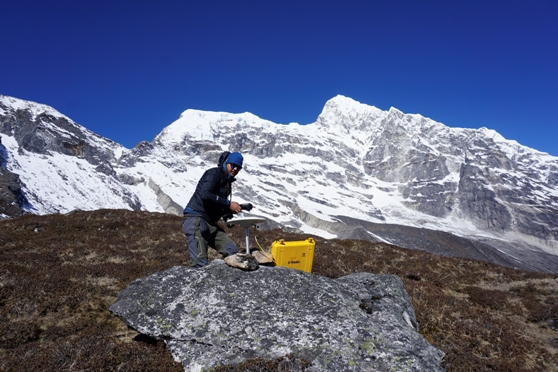Nepal and China give Mount Everest, and their relations, a boost

By Bhadra Sharma and Emily Schmall
KATHMANDU/NEW DELHI— On Tuesday (8), Mount Everest grew by more than 2 feet.
So agreed China and Nepal, two countries that share a treacherously mountainous border and increasingly warm relations. They announced that they had determined the exact height of the world’s tallest mountain, a subject to which the Nepalese government has attached increasing symbolic importance over the years.
Officially, according to Kathmandu and Beijing, Mount Everest stands at 8,848.86 metres, or 29,031.7 feet. For 65 years, the consensus height had been 8,848 metres, or 29,028.87 feet.
As Mount Everest has grown, said Pradeep Kumar Gyawali, Nepal’s foreign affairs minister, in a joint virtual briefing with his Chinese counterpart, so have ties between the world’s second-largest economy and its 101st.
The China-Nepal relationship “will rise across the Himalayas, and it will reach a new height,” Gyawali said.
Xi Jinping, China’s top leader, endorsed the new measure. The announcement fulfilled a promise Xi made a year ago during a visit to the Nepali capital, where he announced with his Nepali counterpart, Bidya Devi Bhandari, that the countries would jointly measure the mountain.
China’s relations with its other Himalayan neighbours have not been as warm. Tensions with India soared in June when unarmed troops from both countries brawled in perilously craggy territory that they both claim, killing 20 Indian soldiers and an undisclosed number on the Chinese side, though the two sides have pledged to ease tensions. China also recently completed a village built in territory claimed by Bhutan, another Himalayan country.
Beijing has been more deferential to Nepal. Communist parties friendly with Beijing won elections there in 2017. China views Nepal as key to its Belt and Road Initiative, which envisions highways, railroads and other big-ticket projects built with Chinese financing across the old Silk Road routes that once connected China to the West. China has moved closer to Nepal as the Himalayan country’s relations with India have worsened.
Against that backdrop, India’s surveyor general offered in 2017 to re-measure Mount Everest. With wounded pride, Nepal said its surveyors were plenty capable of measuring the mountain on their own.
Nepal also initially declined an offer from China but eventually agreed to make it a joint project. Earlier this year, with the mountaineering season cancelled because of the coronavirus pandemic, China sent a survey team up to Mount Everest’s summit with global satellite receivers to measure its northern side.
Nepal had measured the southern side the year before. Nepalese climbers had to work with Indian survey data when it came to precise sea level, since the country is landlocked. From there, they climbed Everest’s snowy ridges in May 2019 carrying the global navigation satellite receiver and an antenna. They stood on the world’s highest point for nearly two hours to capture satellite data.
According to Khim Lal Gautam, the survey officer who led Nepal’s measurement expedition team, it was the first time a surveyor had captured satellite data at that point. Previously, he said, Sherpas, or mountain guides, had done it.
“We made it possible,” Gautam said.
Though it looks immutable, even Mount Everest shifts with time and tectonics. In the aftermath of a devastating 2015 earthquake, it was widely speculated that several Himalayan peaks, including Mount Everest, had shrunk. The new dual measurements suggest the opposite.
Scientists say Everest is getting taller. As the Indian plate slips under the Eurasian plate, it lifts up the Himalayas. But earthquakes can reduce peaks’ heights.
Even without those variables, people have pegged Mount Everest at different heights. In the 19th century, when Nepal was under British rule, Sir George Everest, the former surveyor general of the British-India Survey Office, and his team measured the peak at 8,840.07 metres, or 29,002.85 feet. Since then India, China, the United States, Italy and Denmark have put forth their own measurements.
Nepal has rejected them all — and it has long eschewed the mountain’s colonial-era name, too. During the joint briefing Tuesday, China’s foreign minister, Wang Yi, referred to the mountain as “Qomolangma”, its Tibetan name. Nepal’s foreign minister, Gyawali, called it “Sagarmatha”, its Nepali name.
-New York Times

